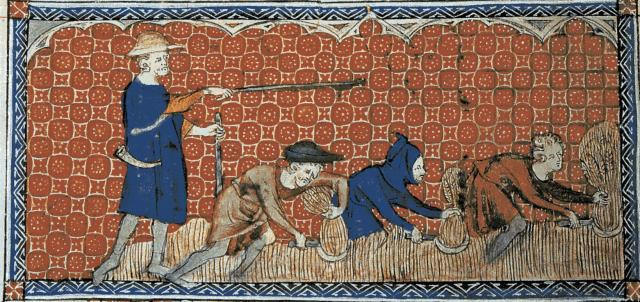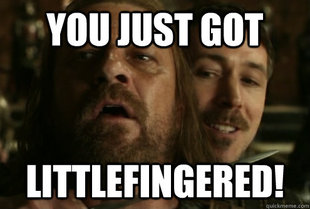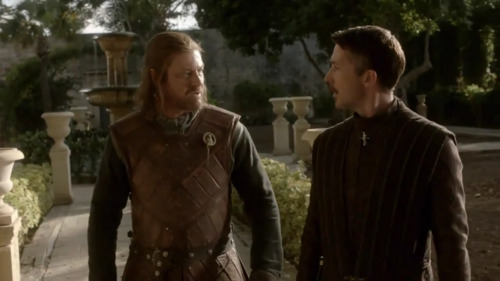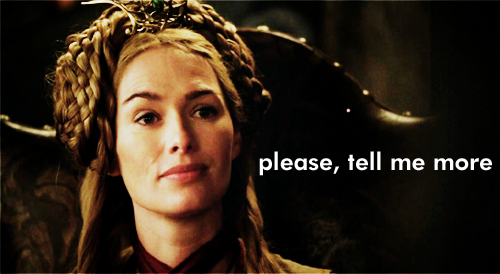A few days ago, I received an email with a very interesting question:
I believe at one point in A Game of Thrones someone remarks that revenue has increased ten-fold under Baelish's stewardship, but no explanation is offered as to how. I have some of my own ideas of how Baelish accomplished these feats, but none seem adequate to explain his level of success. I'd be interested in hearing your thoughts on this, either in reply or on any one of your platforms.
Well, I can give a very short version of my answer: he didn't. The tenfold increase is a myth. The long version comes after the break.
 |
| Slick bastard. |
The background of the story is the following: after being sent back to the Vale for his dumbass duel with Brandon Stark, Littlefinger dwelt on the Fingers and mourned his mistakes, until Lysa Arryn finally arrived at the Eyrie, being the new wife of Jon Arryn. She hadn't forgotten the man who deflowered her and provided him with a low-level job: being responsible of the customs in Gulltown. In charge of said customs, he increased the revenue of the city (read: the Arryns) drastically. So, even Jon Arryn had to see his value and took him to King's Landing upon taking the handship, where he was in charge of, you guess it, the money business, becoming Master of Coins, which doesn't seem to be a job that the nobility usually deems honorable.
 |
| That's Honorable, with a capital h! |
So, later we learn that in his time as Robert's Master of Coins, Littlefinger increased the income of the crown tenfold - and its expenses on the same amount. Simultaneously, we learn that Robert's years weren't one of economic hardship for the commons, so a tenfold increase in taxes can be ruled out. So, how did Littlefinger accomplish this feat? At some point it is remarked that he didn't simply put the new revenue into the vault and locked it away, but that he invested the incoming money into businesses, such as whorehouses and stuff. He also bought commodities and sold them, from bread to cloth to anything else that is traded. He also put his own people in key positions to economically dominate the city.
 |
| Talking to his Master of Whores. |
But none of that attributes to a tenfold increase in revenue, nor to a tenfold increase in expenses. Yeah, Robert likes his tourneys, but even that cannot attribute to ten times the budget that Aerys had. It's a convenient excuse. Even if it did, the expenses actually increased more than tenfold. Else the realm wouldn't be six million in debt. So let's have a look at Littlefinger's motives, shall we? The guy is a lowborn noble from a shit holdfast. Therefore, he has neither the name nor the honor, and his fighting prowess is neglectable. Knowing that, the only way to get a power base is money. Littlefinger obviously knows how to get it, and in Gulltown he used this to great effect. My guess is that he just didn't cheat Jon Arryn that much like the other custom officers did.
 |
| Being totally honest to you, bro! |
Of course, he did this not because he was such an honest and good guy, but because he wanted to earn his trust and make a name as a magician of money. I guess he wasn't exactly popular with the merchants of Gulltown. To understand how this works, you need a little introduction in the idea of tax farming. In ye olden times, the governments didn't rely on an extensive bureaucracy to run stuff. Instead, they turned to local rulers, governors and the like. Lacking a bureaucracy, collecting taxes is a different beast than decreeing them. If the crown was to, say, take a tenth of your earnings - who excactly knows what your earnings are, and that you even live there? The crown of course doesn't. Remember that it also outsources the need to levy troops: in the feudal system, the next lower level of the noble pyramid has to raise the men.
 |
| Take this land, and get me some troops! |
Now, for money, the crown simply sells an office called the "tax farmer". He is assigned to a certain area (for example, King's Landing) and to a goal, say, 50.000 dragons. The tax farmer is obliged to bring in that sum of "taxes". For this, he is given the authority of the government, monarch or whatever (in our case, king Robert). With this authority, on he goes to collect the money by any means necessary. Now, in order to make a profit, he needs to get more than the king asked, because there is no salary. Since the king doesn't know shit about his own subjects and doesn't want to strangle his economy, he usually sets the bar pretty low. For the tax farmers, this was a huge incentive to press the people in their district as hefty as they could. So, tax farmers got ridiculously rich.
 | |||
| You can see in this picture how popular the guys must have been. |
Now, you need to imagine Littlefinger as the chief tax farmer. He appoints all the other tax farmers, and of course, being the nice guy that he is, demands a big cut as well. To come back to our initial example, Robert would demand 50.000 dragons of King's Landing, Littlefinger would demand an additional 50.000, and the tax farmer wants 50.000 for himself, so the people of the city need to pay 150.000 dragons in total. But what has all this to do with the revenue of the realm? Nothing, on the surface. It explains just that Littlefinger himself is very rich, and how he could theoretically boost income.
 |
| Oh certainly you were. |
Tyrion, upon taking the office himself, totally fails to make any sense of Littlefinger's books, but he gets the bad feeling that he was up to no good. In a world where double accounting isn't invented yet and almost everyone doesn't understand economics beyond a very basic level, this shouldn't surprise us. Tyrion struggles greatly at getting money just to repair the gates, and there are no tourneys or extravagant celebrations any more since Margaery's wedding. So shouldn't the revenue be real high? Yet it isn't. And, I stress this point again, Littlefinger's books are a mess and don't explain anything. They seem to obscure more. And of course, that's exactly the point. Littlefinger used the realm basically as a machine to enrich himself, investing the money, allright - in his own ventures. In his books, he put it like it would all benefit the crown and at the same time exaggerated expenses while financing the real expenses by borrowing. It's a ponzi scheme, basically.
 |
| You wouldn't believe this, Lord Stark, but you inherited a fortune of a South African Prince! |
So, neither the tenfold increase nor the tenfold expense increase really exists. Littlefinger just diverted the royal incomes into his own coffers and maintained the level of Robert's spending by borrowing heavily from the Lannisters, the Faith and the Iron Bank of Braavos, essentially making the Iron Throne too big to fail. The money that he gains is used for direct political gain, e.g. in bribing Janos Slynt or buying the Kettleblacks.
There is of course another possibility: it may be that Littlefinger really cracked down on corruption and managed to get the revenues that high and that he uses the crown for all his political bids (Slynt et al). In that case, the numbers would make more sense, but it seems rather shortsighted of Littlefinger: his ultimate goal is leaving King's Landing as a high lord to marry Lysa Arryn, so he leaves behind all his financial power as well if it's tied more directly to the office of Master of Coin. It also leaves the question why Littlefinger's tax farmers haven't reported to Tyrion and hammered new deals for themselves. I firmly believe that Baelish redirected the revenues into his own coffers, since it makes more sense as a political move.

Outing myself as understanding as much about econimics as most people in the Middle Ages: WTF does "too big to fail" even mean?
ReplyDeleteIs this not just some petty excuse bankers use to pry money out of states?
My understanding, and I think how Stefan is using it, is it refers to an organization that has borrowed so much/has so much investment/debt wrapped up within it, that for it to default/fail/go under would cause ripple effects that would hurt/destroy all the interconnected businesses which have leant money, etc.
DeleteExactly.
DeleteThis is the best look at Littlefinger I've seen yet, and pierces through alot of the hogwash. People read the books, and just accept that Littlefinger was a financial wizard who was just good with money in a time people were not good with money. They accept this because there are men in our time like George Soros, and other highly intelligent traders who can use market trades and mechanisms to enrich themselves to an incredible extent. But this type of wizardry requires markets and exchanges that just straight up did not exist in an economy of the middle ages. Theft is the only reasonable answer, and this explanation of theft is probably correct, although it does make Robert look even dumber and Jon Arryn look like an absolute fool.
ReplyDeleteThanks for answering my question Stefan. I wanted of offer my two cents on this. I thought up a few explanations for how Littlefinger is producing all this money.
ReplyDeleteTheory 1: Inflation - When I first heard about the tenfold increase in both revenues and expenses I thought Littlefinger may have been diluting the gold/silver content of the coins. By decreasing the portion of precious metal one can increase the number of coins in circulation, while also skimming off some for himself.
Problem: There is no mention of inflation or price increases except for the cost of bread when King's Landing is cut from agricultural products. Still, with so many more gold dragons floating around the economy one would think that it would have an impact. GRRM knows about inflation as any American who lived through the 1970s would. Pre-modern societies hated inflation and it could cause major instability.
Theory 2: The Long Summer and "Higher" taxes - The years of Robert's reign are considered by the smallfolk to be a good time. Aside from the Greyjoy Rebellion it was a time of peace and the Long Summer assured it as a time of prosperity. Littlefinger may have simply been Master of Coin in a boom period. Also, tax farmers may have been pressured/able to deliver higher levels of taxation than before.
Theory 3: Proto-Bureaucracy and Littlefinger's Spies - This theory combines ideas expressed by others, but I believe is synthesized uniquely here. Littlefinger given his low-noble birth, appears more open minded to using commoners. Perhaps Baelish had established a personal modern bureaucracy to collect taxes. By selecting reasonably educated smallfolk he assigned them tax farms, custom houses, tolls, etc. and instead of a lump sum offers them generous salaries. These men would owe their position entirely to Littlefinger and perhaps continue to funnel money to him as he pays them. Therefore instead of building a bureaucracy loyal to the state he built one loyal to him. When he leaves King's Landing the revenues go with him leading to Tyrion's baffled assessment of the books. The reason they don't seek Tyrion out is because they are still being supported by Baelish's network. This could lead to dramatically more efficient revenues and incomes. It also explains partially what Baelish is doing with the money.
Which is a big question, what is Baelish doing with the money? It isn't evident in his holdings in the Vale. It must be somewhere, and his "business interests" seems an unsatisfactory explanation.
"what is Baelish doing with the money?"
Delete1. He's buying political power and a network of spies/agents.
2. He's buying up real estate and businesses (whorehouses, ships, etc.).
3. He's speculating in commodities (wine, wool, silks, etc.).
4. He's lending money. Littlefinger is essentially a bank in all but name.
Thanks for the comprehensive view!
DeleteI hope Martin explains in text a little bit what Littlefinger has done. I find this a fascinating question. I think Steven's explanations of what is happening with the missing funds makes sense, but there is limited proof.
DeleteI read some of the comments on the Tower of the Hand piece and there is a lack of evidence, though there is logic behind this article. Anyway, thanks for the explanation it is the best one I've seen so far. :)
Having read much so called "textual evidence" that is brought forth in the community on various topics, I settle for logic.
DeleteSJL - there isn't a whole lot of textual evidence. I gathered as much as I could find for Eddard IV, and it comes down to a couple of lengthy passages in Tyrion IV of Clash of Kings, and Sansa VI in Storm of Swords, and Tyrion III and VII in A Storm of Swords.
DeleteA lot of it is logic - simply put, if the treasury starts out full and incomes are increasing, debt on the scale that Littlefinger reports would require a vast increase in expenditures that simply isn't explainable from Robert's behavior.
Stefan - yes. I came to much the same conclusion in my recap of Eddard IV. One thing I would add - the loans are the critical thing here, because in addition to making himself rich, Littlefinger is also making himself indispensable and setting up his future plans for profiting through chaos.
ReplyDeleteLittlefinger doesn't just borrow massively - critically, he doesn't pay any of the loans back from royal incomes, not even the interest; instead, he takes out other loans to cover the interest (using the appearance of a tenfold increase in revenues as surety). This is professional malpractice, but it's very important for him. Firstly, it means that he can dedicate as much of the loan revenue and the tax revenue as possible to his own economic project - the buying up of whorehouses and real estate, speculating on commodities, buying up ships, becoming a financier, etc. But secondly, it means that the debt becomes incredibly difficult to manage - which means that the crown needs someone with Littlefinger's skills and knowledge to understand their books, let alone service their debts and finance the government. Tyrion when he's Hand of the King, when he has every reason in the world to throw Littlefinger into the black cell next to Pycelle, can't because only Littlefinger can give an accurate account. Littlefinger's become untouchable. Thirdly, it creates a power base for Littlefinger in the merchant community - since Littlefinger is the only one who knows how to balance the books, and since many of them work for him or are dependent on favors to him, and since many of them either have loaned money to him or are borrowing money from him or are business partners in commodities or real estate or the like, Littlefinger's very presence (like Necker in the ancien regime) is a sign of fiscal probity. Fourthly, Littlefinger essentially can control the crown on anything that costs money - if he's willing for something to happen, when they come asking him to find the money, he can always borrow more, or simply "borrow" the money from the crown's own funds, and suddenly he's the miracle worker who can find money from nowhere. If he's not willing, suddenly the treasury can't afford it.
If I recall correctly most of the loans come from the Lannisters. Therefore, I wonder if Tywin was aware of some of what Baelish was up to. As the Crown's chief financier he was motivated by gaining greater leverage over the Iron Throne, or making sure his daughter and grandchildren did not become vulnerable, or both.
DeleteDoes Baelish operate in Tywin's ignorance, apathy or acquiescence? It raises some interesting questions.
Ignorance, most like. Tywin Lannister doesn't seem like someone who has a good grip of economics. He has a grip of "what is mine" and "what is yours which I want to have".
DeleteIt's a bit of deliberate ignorance and a bit of apathy. Tywin doesn't know about economics - that's the kind of thing that grubby merchants obsess over (noblemen have better things to concern themselves with), and it's the reason one hires stewards so that one don't have to sully oneself with such men.
DeleteIt's also the case that Tywin doesn't care why the loans were taken out or what the crown did with the loans. In his eyes, the Crown is in his debt, and as a Lannister he will ensure he is repaid in full. Look how he acts as Hand - even when his grandson's on the Throne, he insists that the Crown must repay the debt down to the last penny.